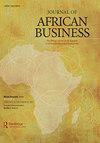新兴市场跨国公司的可持续性话语:以南非最大公司为例
IF 1.8
Q3 BUSINESS
引用次数: 1
摘要
摘要尽管跨国企业在促进可持续发展方面发挥着至关重要的作用,但在实现联合国2030年可持续发展议程方面进展缓慢。跨国公司负有部分责任,尽管他们认识到自己是一个更大的社会、经济和生态生态系统的一部分,可持续性可以增强其长期增长和生存能力,但他们接受这一点的速度很慢。可持续性和跨国公司文献最初侧重于发达市场跨国企业(或DMNE)的可持续性优先事项。来自新兴市场地区的“本土”(或本土)跨国公司越来越受到关注,但对新兴市场背景下可持续性的研究仍然滞后,尽管新兴市场及其企业可能从拥抱可持续性中获益匪浅。本文考察了南非的可持续性话语,并确定了南非最大本土企业的可持续性优先事项。2019年南非最大上市公司的可持续性报告使用中心共振分析(CRA)进行了分析。结果表明,南非跨国公司更注重可持续性的商业和社会方面,而不是环境保护举措。这一发现可能反映了:1)南非的背景及其可持续性优先事项,2)不同的部门样本,3)南非跨国公司子公司的地理分布(存在于其他新兴、发达或发展中市场,根据市场状况具有不同的可持续性优先权),或4)这些因素的组合。本文章由计算机程序翻译,如有差异,请以英文原文为准。
Sustainability Discourse in Emerging Market multinationals: The Case of South Africa’s Largest Firms
ABSTRACT Despite the crucial role that multinational enterprises (MNEs) can play in advancing sustainability, progress toward meeting the United Nations’ Agenda for Sustainable Development by 2030 has been slow. MNEs are partly responsible, and even though they recognize that they are part of a larger social, economic and ecological ecosystem, and that sustainability can enhance their long-term growth and viability, they have been slow to embrace it. The sustainability and MNE literature initially focused on the sustainability priorities found in developed market multinational enterprises (or DMNEs). Increasingly, “home-grown” (or indigenous) multinationals from emerging market regions have garnered more attention but research on sustainability in the emerging market context is still lagging, despite the fact that emerging markets – and its businesses – have potentially much to gain from embracing sustainability. This paper examines the sustainability discourse in South Africa and identifies the sustainability priorities of its largest indigenous firms. The sustainability reports of South Africa’s largest public firms in 2019 were analyzed using Centering Resonance Analysis (CRA). Results indicate that South African MNEs focus on business and societal aspects of sustainability, more so than on environmental protection initiatives. This finding likely reflects: 1) South Africa’s context and its sustainability priorities, 2) a diverse sectoral sample, 3) geographic dispersion of South African MNE subsidiaries (presence in other emerging, developed or developing markets with different sustainability priorities by market profile), or 4) a combination of these factors.
求助全文
通过发布文献求助,成功后即可免费获取论文全文。
去求助
来源期刊

Journal of African Business
BUSINESS-
CiteScore
4.60
自引率
10.50%
发文量
36
期刊介绍:
Journal of African Business is the official journal of the Academy of African Business and Development, the largest network of professionals committed to advancement of business development in African nations. JAB strives to comprehensively cover all business disciplines by publishing high quality analytical, conceptual, and empirical articles that demonstrate a substantial contribution to the broad domain of African business. Regardless of the research context, tradition, approach, or philosophy, manuscripts submitted to JAB must demonstrate that the topics investigated are important to the understanding of business practices and the advancement of business knowledge in or with Africa. Particularly, JAB welcomes qualitative and quantitative research papers. JAB is not, however, limited to African-based empirical studies. It searches for various contributions, including those based on countries outside Africa that address issues relevant to African business. Targeted toward academics, policymakers, consultants, and executives, JAB features the latest theoretical developments and cutting-edge research that challenge established beliefs and paradigms and offer alternative ways to cope with the endless change in the business world. Covered areas: Accounting; Agribusiness Management and Policy; Business Law; Economics and Development Policy; Entrepreneurship and Family Business; Finance; Global Business; Human Resource Management; Information and Communications Technology (ICT); Labor Relations; Marketing; Management Information Systems (MIS); Non-Profit Management; Operations and Supply Chain Management; Organizational Behavior and Theory; Organizational Development; Service Management; Small Business Management; Social Responsibility and Ethics; Strategic Management Policy; Technology and Innovation Management; Tourism and Hospitality Management; Transportation and Logistics
 求助内容:
求助内容: 应助结果提醒方式:
应助结果提醒方式:


